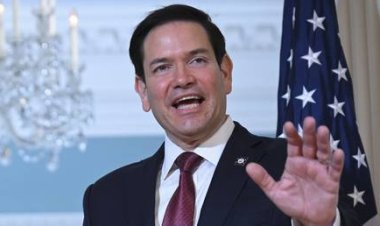Why Democrats Should Heed the Warning from Ruben Gallego's Laken Riley Vote
In supporting the Laken Riley Act, the Arizona senator expressed a departure from his party, stating that it is “largely out of touch with where your average Latino is.”

Just days into his Senate tenure, the Democrat supported the Laken Riley Act, a pivotal move that bolstered the GOP-backed immigration bill aimed at increasing the incarceration of undocumented immigrants accused of crimes. In an interview, Gallego pointed out that this could mark the beginning of a pattern of bipartisan votes on immigration and border matters, as he believes these issues contributed significantly to the Democrats' losses in 2024.
“I’m bringing the perspective of working-class Latinos from Arizona,” he said. “And that perspective, I think, has been missing.”
The notion of Gallego, the son of Mexican and Colombian immigrants, granting President Donald Trump an early legislative victory is surprising, especially considering that just two years ago he challenged Sinema, openly criticizing her cross-party alliances that he argued hindered Democratic legislative goals.
The passage of the GOP immigration bill, which made its way through the Senate on Monday and could soon reach Trump's desk, indicates that Minority Leader Chuck Schumer may have a new challenge as he seeks to keep party unity against a consolidated Republican majority. House Republicans have also presented a targeted immigration bill concerning domestic abusers, seeking to take advantage of the division among Democrats, with additional piecemeal bills anticipated.
Gallego clarified that he has no intention of becoming a divisive figure like Sinema or Sen. Joe Manchin of West Virginia in past Congresses. He informed Schumer of his decision to support the bill, asserting his commitment to “be very transparent about where we're going to be and why.”
The Laken Riley Act has faced harsh criticism from the left, with a notable activist group accusing its supporters of being “complicit in perpetuating Trump’s plans for mass cruelty and eroding trust in our nation as a place of refuge and opportunity.” Only 11 out of 47 senators in the Democratic caucus joined Gallego in passing the bill, while many critics, representing states with different immigration dynamics, refrained from commenting on his role in its advancement.
“I just don’t comment on other people’s votes,” remarked Sen. Chris Murphy, who opposed the Laken Riley Act and played a role in drafting a previous bipartisan border bill. Sen. Ben Ray Luján, another opponent and one of six Latino senators, added, “I don't represent Arizona. I represent New Mexico. I voted against it.”
Gallego remains determined to shift perceptions among his colleagues regarding Latino opinions on border security. “There has been this misunderstanding about where Latinos are when it comes to border and border security,” he explained. “I'm here to bring some more real truth about what people are thinking … and so people here and senators here aren't necessarily reliant on these immigration groups that are, I think, a lot of times, largely out of touch with where your average Latino is.”
With a two-point victory over Republican Kari Lake amid a broader Democratic loss to Trump, Gallego highlights his understanding of Latino voters’ sentiments on border security and immigration. He posits that his approach may help his party regain footing after the 2024 defeats.
“I think that [the Trump campaign was] just closer to where people were,” he stated. “Our campaign, I think the reason why we did as well as we did is because we nailed it exactly where we wanted.”
This perspective resonated with Republicans. Sen. Katie Britt, the Laken Riley Act’s lead sponsor, expressed her "thrill" at Gallego joining support for the bill. “That takes courage, and it also means you’re listening to the American people,” she remarked.
“You’re talking to a member who voted on a lot of bipartisan bills,” noted Sen. Thom Tillis, who has collaborated with Democrats on recent bipartisan measures. “And now it's time for people like Gallego to stand up and see if they're committed to bipartisanship, and that's a good first step.”
While Gallego was not the first Democratic senator to support the Laken Riley Act—Sen. John Fetterman took that step—he was the first Latino to do so. He now aims to shape discussions about both the future and past stances of his party.
“The position that some Democrats have taken in the past... is that there shouldn't be limits on people crossing the border, that there shouldn't be deportations, that there shouldn't be restrictions for people that are causing problems, like the monster that killed Laken Riley,” Gallego stated, reiterating the views of his constituents. “They want more Border Patrol, they want more border investments and enforcement … and they also want immigration reform,” he said.
Looking ahead, Gallego is open to collaborating with Republicans on specific issues but intends to avoid following Sinema's pattern of forging tight connections with GOP colleagues. He also dismissed the idea of meeting with Trump, asserting, “I'm not that kind of politician. Look, my relationship with the Trump administration is going to be around policy.”
Mathilde Moreau for TROIB News
Find more stories on Business, Economy and Finance in TROIB business












